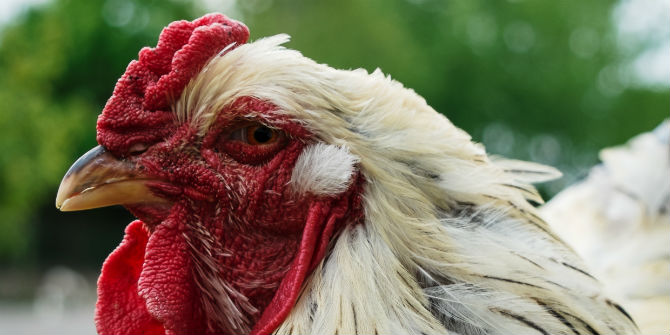

 Nigel Farage set the tone for a great deal of the press coverage of the EU referendum. Discourses of Brexit, a new collection edited by Veronika Koller (Lancaster University), Susanne Kopf (Wirtschaftuniversität Wien) and Marlene Miglbauer (Pädagogische Hochschule Burgenland), looks at the different discourses used by the Leave and Remain campaigns. In this extract from the book’s introduction, they offer insights into why Leave was successful.
Nigel Farage set the tone for a great deal of the press coverage of the EU referendum. Discourses of Brexit, a new collection edited by Veronika Koller (Lancaster University), Susanne Kopf (Wirtschaftuniversität Wien) and Marlene Miglbauer (Pädagogische Hochschule Burgenland), looks at the different discourses used by the Leave and Remain campaigns. In this extract from the book’s introduction, they offer insights into why Leave was successful.
The result of the EU referendum – indeed the referendum itself – might well not have happened without UKIP and its former leader, Nigel Farage, who now leads the Brexit Party. The party had been campaigning for Britain to leave the EU since being founded in 1993, with Farage positioning himself as a hero on a journey to take on the EU and UK political establishment and purporting to speak for an otherwise disempowered British people.

In his analysis of two articles on the party leader from the right-wing news website Mail Online, Darren Kelsey shows how metaphor, narrative and interdiscursivity combine to represent Farage as a missionary who has overcome challenges and makes sacrifices to pursue his goals. In addition, his public image – constructed by himself, sympathetic media articles and many readers commenting online – of a smoking and drinking, joking and straight-talking character makes him an embodiment of the “laughing, irreverent Briton” (as Imke Henkel puts it) who stands up against authority, including the EU.
His persona is both that of a hero and a “paradoxical, unpredictable, powerful” trickster. The same confrontational but playful stance can be seen in UKIP’s campaign video We’re Better Off Out: in a metaphoric narrative that depicts the British people as chickens, the EU as a dark warehouse and powerful figures in the EU as a controlling farmer, two brave chickens venture into the sunny landscape outside, followed by the other chickens, and leave the farmer powerless. The video makes an intertextual link to the Aardman animation film Chicken Run, which in turn draws on the film The Great Escape. Through this intertextual chain, the EU is metaphorically represented as a prison. Gloria Isabel González Caballero shows how grammatical and visual devices are used in the video to construct oppositional pairs – British people vs EU, Leave vs Remain voters – and an empowerment of the British people that goes together with a loss of power for the EU over Britain.
Since the 2016 referendum, much research has investigated the role of the media in the campaigns and their possible influence on the outcome of the vote. While Ian Lamond and Chelsea Reid see the press and broadcast media as contributing to a view of democratic participation as spectacle, David Deacon et al.’s large-scale study of press and broadcast reporting during the referendum campaigns found that newspapers were skewed towards Leave, while public radio stations and television channels – which are regulated to be impartial – showed more of a balance. In addition, Mike Berry notes that “the Remain campaign was unable to build a positive case for Europe partly because those narratives had not been comprehensively established in the past by media and politicians”. However, the author also states that “the Remain campaign lacked a clear, simple narrative on the benefits of EU membership that could resonate at both a rational and emotional level with different audiences”, as did the ‘Take back control’ slogan of the Leave campaign. In terms of its media engagement, Vote Leave maintained a tight thematic focus on immigration and was “most active in terms of press releases and media strategy” (Paula Keaveney, 2016, p75).
The Leave campaign produced a greater number of press releases faster than did the Britain Stronger in Europe campaign and, in contrast to the latter, used both “planned material [. . .] and reactive or opportunistic material”, writes Keaveney. In terms of rhetoric and the linguistic devices employed by the respective campaigns, Andrew S Crines finds that “the Leave side used appeals to pathos whilst the Remain side relied more upon logos-driven arguments”. Vote Leave also appealed to ethos in constructing its advocates as likeable personas.
Similar findings have been reported for comments on the Facebook pages of the two campaigns: members of the two groups not only showed negativity towards each other, but “underlining the negativity and scare stories were hopeful messages from citizens who expressed their desire to create what they believed would be a freer country able to better determine its own destiny”, writes Darren G Lilleker.
By contrast, postings on the Britain Stronger in Europe Facebook page contained “a dispassionate reiteration of the economic arguments for leaving the EU” and where Remainers did show emotion, they seemed largely to be “more driven by [. . .] fear than desire”. While both negative and positive emotions can be strong motivations, emotion itself is stronger than rationality, leaving the Leave campaign with a distinct advantage. Language use helped it further: as Steve Buckledee has shown, Remain supporters used syntax and grammar in a way that inadvertently emphasised perceived negative aspects of the EU and also “tended to give the impression that they were not 100 per cent convinced by their own arguments”. Vote Leave, on the other hand, used unmodalised statements to dispel doubts. They also employed imperatives that often included the voter (‘Let’s take back control’) and made good use of metaphor to portray EU membership as restricting the freedom of British people, a metaphor also visualised in the UKIP video.
This post is an edited extract from Discourses of Brexit (Routledge), edited by Veronika Koller, Susanne Kopf and Marlene Miglbauer. It represents the views of the author and not those of LSE.
Veronika Koller is Reader in Discourse Studies at Lancaster University.
Susanne Kopf is an Assistant Professor at the Vienna University of Economics and Business (Wirtschaftuniversität Wien), Austria.
Marlene Miglbauer is a senior lecturer at the Pädagogische Hochschule Burgenland, Austria.







This article makes a good stab at defining the superiority of the Leave campaign over the Remain campaign in campaigning terms. But surely it cannot be right to omit any reference to the much greater use of distortions and downright lies on the Leave side. All political campaigns make, shall we say, the most of their material but it is without question that the Leave side were overwhelmingly worse in ignoring the truth. Not just the famous exaggerated cost of EU membership on the bus but also the entire “we can have all the benefits without the responsibilities and costs” trope which dominated the coverage. You should have included this in your assessment.
I would agree that Remain seemed more apologetic than Leave in the referendum campaign.
There was no emphasis on the massive advantages of EU membership in the Remain campaign. It was more “We agree with Leave that EU membership has a lot of disadvantages, but if the UK was to leave the EU things would get even worse”.
This would seem to suggest that supporters of EU membership should be much more positive about EU membership in any future campaign.
@Friedrich: “This would seem to suggest that supporters of EU membership should be much more positive about EU membership in any future campaign.” If you don’t have it it’s difficult to fake it. I think a major problem for Remainers before the referendum was that very few UK citizens, even those who wanted to remain in the EU, had much of a sense of a European identity. It’s telling that the Remain arguments were mostly financial. I suspect that in a referendum, national sentiment will almost always win over theoretical financial arguments, because national sentiment is more immediate. People do not support or oppose Scottish independence because of theoretical arguments about oil prices and currency stability, but because of national sentiment. They then construct the theoretical arguments to suit what their sentiment tells them. In the EU referendum, the theoretical arguments were weak, because nobody really knew what would happen after Brexit. (They still don’t know.) So it is not surprising that for many people, national sentiment won.
If there were a second referendum and Remain were to win, it would be more a sign of grudging acceptance that life outside is financially too difficult. Like someone who has tried leaving the parental home but been forced to move back because the rents are too high. It would not be a sign that that UK citizens had been transformed into enthusiastic Europeans. If the UK had already exitted the EU and was applying for readmission, I could imagine many of the EU27 being not at all happy to allow the rebellious member of the family back.